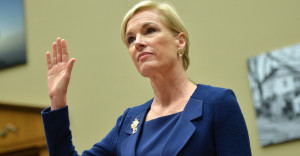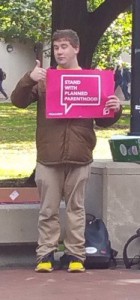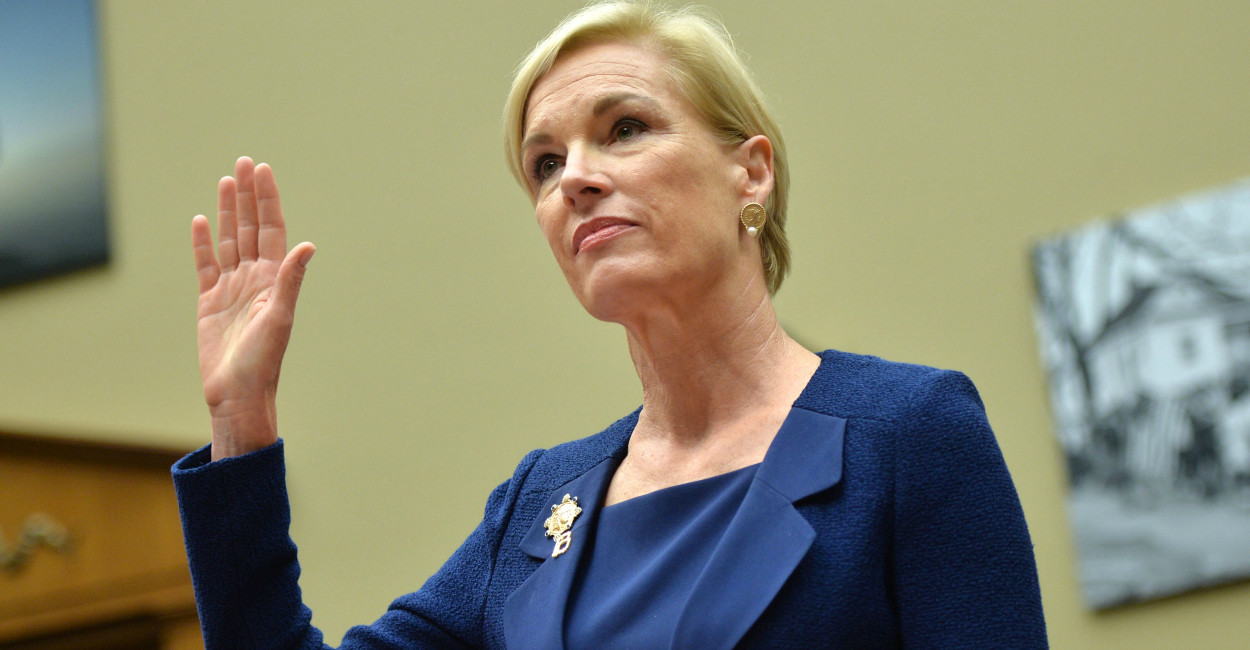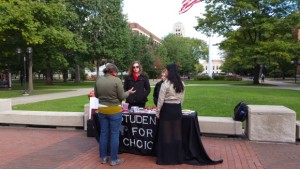The Diag, Ann Arbor – Students for Choice (SFC), a pro-choice group at the University of Michigan, held an informational event on the Diag on Thursday, Oct. 1st.
Support was shown by Planned Parenthood by allowing students to create “thank you” cards and pose for pictures holding signs that read #StandwithPP, to pass out stickers, buttons, and condoms, and to correct misinformation. In the roughly three hours that I spent there, I saw around 50 students visit the table that SFC had set up.
One student, Connie, an organizer for SFC, had this to say when asked about her personal opinion on abortion: “It’s complicated. My mother actually had several abortions in China—because of the one-child policy. … I just think women should have a choice—whether to raise a child, abort, give it up for adoption. And those options should be safe.”
One must be willfully ignorant of embryology to believe that what is inside a mother is not a human being. I wonder if this is Connie’s view, or if she recognizes the humanity of the unborn but simply averts her gaze? Does she realize that the option to abort is never even remotely “safe” for the baby because a successful abortion always results in the death of a child?
Planned Parenthood President Cecile Richards gave sworn testimony before Congress on September 30th, admitting that Planned Parenthood’s over 600 clinics do not have a single mammogram machine and thus do not provide that service to women, and that abortion is 86% of the organization’s business, not the oft-bandied-about 3% figure.
 Asked about the hearing, Connie responded, “I’m not sure I want to offer my reaction because of how you might want to twist my words.” She added, “We have a lot of great resources for women.”
Asked about the hearing, Connie responded, “I’m not sure I want to offer my reaction because of how you might want to twist my words.” She added, “We have a lot of great resources for women.”
I spoke with a number of other students—both organizers and casual observers—about the event and their views on abortion and Planned Parenthood more generally.
Tyree, a kind student at the university who stopped by the table to have a hashtagged picture taken of herself and pick up some memorabilia, told me that she thinks it’s “everybody’s choice” about whether to avail oneself of an abortion procedure.
Apparently this egalitarian courtesy stops at babies.
She continued, “Anyone should be able to get one if they want it. I don’t think my personal opinion should decide if someone gets one or not.”
Her view seems fairly commonplace among the American electorate. For its abortion policy poll, Vox.com solicited answers from 1,067 adults. Sarah Kliff breaks it down in her April piece, What Americans Think of Abortion, with a chart that shows that over 70% of people “want a woman’s abortion experience” to be “nonjudgmental.”
“So abortion restrictions are a no?” I asked Tyree.
She laughed a bit uncomfortably. “I know people in high school and they weren’t at a point where they could have a child. It wouldn’t have been good for either the mother or the baby. But I also know others who were fine with having the child; that’s what they wanted. I just think the option should be there.”
Tyree had no opinion on Cecile Richards’ testimony before Congress, as she “isn’t super political.”
Yet she is able to take a stance on one of the most charged and politicized issues of contemporary America. She feels it is not her place to step up and speak out for those who cannot literally do this for themselves. That she would allow the powerful to kill the powerless makes my stomach churn.
But what do I know?
I was able to connect with a male organizer of the SFC event, Jake, later that day.
“I think it’s up to the woman,” he explained when asked his view on abortion. “She should have her choice be an option regarding healthcare and her own body.”
I pressed him on Cecile Richards’ testimony that occurred the day before. He was extremely reluctant to even admit that the testimony had even happened. I again pressed the point, saying, “The testimony did occur. Are you saying that it did not, that Cecile Richards was lying under oath?” He would only say that “Cecile Richards might have had her facts wrong. Just because she is the president of Planned Parenthood doesn’t mean that she knows everything about the organization.”
Pressed further, Jake said, “But if this were true, hypothetically, it would be very concerning.”
He concluded our brief conversation by saying “I’m here to empower women and to support women and their healthcare. I stand with Planned Parenthood.”
The cognitive dissonance and confirmation bias are strong with this one, to say the very least.
Some students were reluctant to speak with me after I declared that I was a reporter for the Michigan Review.
One student, Moe, didn’t want to answer any of my questions on the record when I caught up with him after he’d left the SFC table. I had my pen poised to take down notes on his reply to my first question, “Why do you consider yourself to be pro-choice?” He would only say that he just didn’t “want to be quoted in anything” as he quickly walked off.
He was brave enough to stand with an organization that butchers children in the womb for profit but couldn’t take a even a minute out of his own day to stand by those convictions in print. It makes you wonder how courageous one really has to be to identify as pro-choice. Just enough to pick up your free bumper sticker and condoms, it seems.
I approached a few students a little ways away from the SFC table, sitting on a bench and one leaning against light pole. I introduced myself and asked their opinion on abortion and on the event. One man, Robert, said, “I see myself as pro-life. But I don’t fit as pro-life or pro-choice,” as he leaned back to stretch.
“So you don’t consider yourself pro-life in the standard sense?”
“No, especially as a dude, you know?” he quipped. “Definitely not my place to be saying anything!” as he laughed a bit with his two other male friends.
But 50 percent of children destroyed in the womb are males, Robert. Will you not speak up for your brothers in the womb, and protect them from the abortionist’s forceps?
The most interesting interview I had that day was with Andy, a non-Christian Unitarian Universalist. “My personal religious values inform my political values,” said Andy.
When asked if he considers himself pro-choice, Andy replied, “Yes. It’s basic healthcare. I’m pro-choice the same way that I’m pro hip replacement, pro appendectomy, and pro wisdom teeth removal.”
I’m a man. I’ve never had the opportunity to become pregnant.
“I think the STD screening, preventing unplanned pregnancies, are hugely important work. I don’t think you can separate those from the other work they do,” said Andy.
When asked his opinion on Richards’ congressional testimony the day before, specifically about Planned Parenthood’s admission that they do not, and never have, provided mammograms, he said, “Like other organizations, they review out for various procedures [like cancer screenings].”
He added, “I trust Planned Parenthood. Their hearts are in the right place. And I think the people interrogating Cecile Richards for over 5 straight hours were trying to make a political point.”
I’m sure the millions of babies killed in utero would have preferred reception of actual basic health care like a wisdom tooth removal or a hip replacement to death in an abortion. If asked, they would probably also have preferred interrogation before Congress to a shot of poison before birth.
But what do I know?
In my three hours on the Diag, I did not come across a single person who was pro-life, in the traditional sense.
Deion Kathawa can be reached at kathawad@umich.edu.

